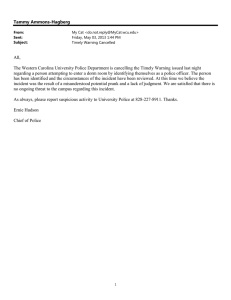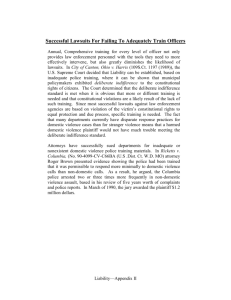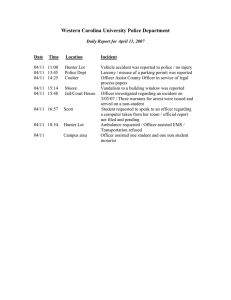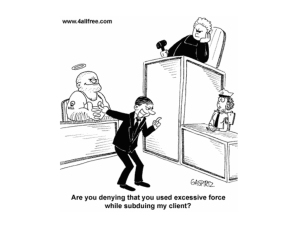Public Safety and Criminal Justice Section
advertisement
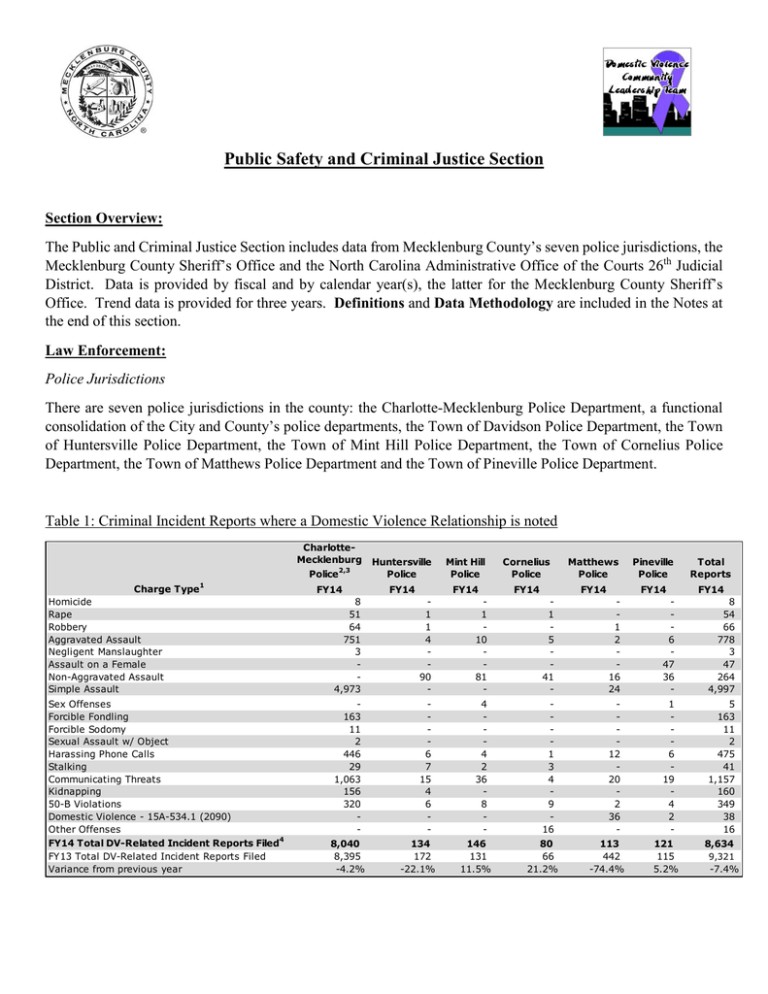
Public Safety and Criminal Justice Section Section Overview: The Public and Criminal Justice Section includes data from Mecklenburg County’s seven police jurisdictions, the Mecklenburg County Sheriff’s Office and the North Carolina Administrative Office of the Courts 26th Judicial District. Data is provided by fiscal and by calendar year(s), the latter for the Mecklenburg County Sheriff’s Office. Trend data is provided for three years. Definitions and Data Methodology are included in the Notes at the end of this section. Law Enforcement: Police Jurisdictions There are seven police jurisdictions in the county: the Charlotte-Mecklenburg Police Department, a functional consolidation of the City and County’s police departments, the Town of Davidson Police Department, the Town of Huntersville Police Department, the Town of Mint Hill Police Department, the Town of Cornelius Police Department, the Town of Matthews Police Department and the Town of Pineville Police Department. Table 1: Criminal Incident Reports where a Domestic Violence Relationship is noted Charge Type1 Homicide Rape Robbery Aggravated Assault Negligent Manslaughter Assault on a Female Non-Aggravated Assault Simple Assault Sex Offenses Forcible Fondling Forcible Sodomy Sexual Assault w/ Object Harassing Phone Calls Stalking Communicating Threats Kidnapping 50-B Violations Domestic Violence - 15A-534.1 (2090) Other Offenses FY14 Total DV-Related Incident Reports Filed4 FY13 Total DV-Related Incident Reports Filed Variance from previous year CharlotteMecklenburg Police2,3 Huntersville Police Mint Hill Police Cornelius Police Matthews Police Pineville Police Total Reports FY14 FY14 FY14 FY14 FY14 FY14 FY14 8 51 64 751 3 4,973 163 11 2 446 29 1,063 156 320 - 8,040 8,395 -4.2% 1 1 4 90 6 7 15 4 6 - 134 172 -22.1% 1 10 81 4 4 2 36 8 - 146 131 11.5% 1 5 41 1 3 4 9 16 80 66 21.2% 1 2 16 24 12 20 2 36 - 113 442 -74.4% 6 47 36 - 8 54 66 778 3 47 264 4,997 1 6 19 4 2 - 5 163 11 2 475 41 1,157 160 349 38 16 121 115 5.2% 8,634 9,321 -7.4% Table 1 shows the number of criminal incident reports filed where a domestic violence relationship is noted by police jurisdiction. (See the Notes for a definition of “Domestic Violence” and a “Personal Relationship.”) Since there is no criminal charge for domestic violence, the listed charges were selected by the Domestic Violence Community Leadership Team (DVCLT) as a proxy to measure domestic violence activity in the county. For instance, the numbers in the table represent a report that was filed with a charge of homicide where a domestic violence relationship was noted. It is important to note that not all homicides include a domestic violence relationship and vice versa. In FY14, the total number of criminal incident reports filed where a domestic violence relationship is noted is 8,634, which is a 7 percent decrease from the previous year. The Charlotte-Mecklenburg Police Department includes the Town of Davidson’s report counts in its total and has 8,040 criminal incident reports with a domestic violence relationship noted for the fiscal year. The majority of the county’s population resides in the Charlotte-Mecklenburg police jurisdiction. The Town of Matthews Police Department reports 113 criminal incident reports with a domestic violence relationship noted. This is a 74 percent decrease from prior year and is noteworthy for further exploration. In FY14, there are 4,997 total reports indicating Simple Assault as the charge type with a domestic violence relationship noted. The second most frequent charge type is Communicating Threats with 1,157 total reports. Graph 1: Three-year Summary on Total Number of DV Incident Reports5 11000 10000 9722 9321 8634 Number of DV Incident Reports 9000 8000 7000 6000 5000 4000 3000 2000 1000 0 FY12 FY13 FY14 Graph 1 shows the total number of criminal incident reports for seven police jurisdictions in the county. The three-year trend pattern is a slight decrease per year in the total number of criminal incident reports with a domestic violence relationship noted. Mecklenburg County Sheriff’s Office (MCSO) The Mecklenburg County Sheriff’s Office (MCSO) is responsible for serving protective orders to perpetrators and for seizing and destroying any weapons that may be found in the home of individuals impacted by domestic violence. These law enforcement activities are ordered by a local judge in the county’s court system. (“Protective Order” is defined in the Notes.) Table 2 summarizes three calendar years of MCSO law enforcement activity as it relates to domestic violence. In 2014, 3,395 Domestic Violence Protective Orders were received by the MCSO, which is a slight decrease from the previous year. The three-year summary shows a decreasing trend on DV Orders received. In addition, the Table shows data on the weapons in the homes of families affected by domestic violence. In 2014, the MCSO destroyed 7 weapons per an order(s) signed by a judge. This is a dramatic decrease from 2013. In September 2013, an amendment to the NC State Statutes (amending §14-269.1, §15-11.1, and §15-11.2) was passed and ratified, which has a direct impact on the destruction of seized firearms. This legislation (NC SB 443) is indicative of the decrease from 2013 to 2014. Likewise, judges can order sheriff deputies to release weapons that are currently stored by the MCSO. The number of weapon releases is increasing over the three-year summary period. In order for a weapon to be released or returned to its owner, certain conditions must be met for the judge to sign an order for the MCSO to release the seized weapon. (The 10 criteria for releasing a seized weapon are listed in the Notes section.) Any increase (or decrease) relates to the number of orders by a judge; the MCSO cannot release a weapon arbitrarily. Table 2: Three-year MCSO Data Summary for Domestic Violence6 DV Orders Received DV Orders Served Weapons Seized7 Weapons Destroyed Weapons Released 8 9 Seized Weapons Currently Stored by MCSO10 2012 3,681 2,871 2013 3,551 2,890 2014 3,395 2,889 96 122 115 51 100 7 42 47 99 N/A 203 315 NC Administrative Office of the Courts, District 26: The North Carolina Administrative Office of the Courts (AOC) is charged with keeping data on case filings and dispositions in criminal and civil courts. Domestic violence protective orders are filed and adjudicated in district civil court. Violations of the protective order are settled in criminal court at either the district or superior court levels. Table 3: Summary of Protective Order Case Filings in 26th Judicial Civil District Court11 Number of Case Filings Protective Order FY12 2,909 FY13 2,934 FY14 2,898 Table 3 shows three fiscal years of Domestic Violence Protective Order case filings in the 26th Judicial Civil District Court, which is Mecklenburg County’s Judicial District. The three-year trend line is consistent with a slight decrease in the number of filings from FY13 to FY14. Graph 2 illustrates the trend line. Graph 2: Protective Order Filings in 26th Judicial Civil District Court Number of Protective Orders Filed 5000 4000 3000 2909 2934 2898 FY12 FY13 FY14 2000 1000 0 Notes for Public Safety and Criminal Justice “Domestic Violence” (NC GS 50B-1) means the commission of one or more of the following acts upon an aggrieved party or upon a minor child residing with or in the custody of the aggrieved party by a person with whom the aggrieved party has or has had a personal relationship, but does not include acts of self-defense: (1) Attempting to cause bodily injury, or intentionally causing bodily injury; or (2) Placing the aggrieved party or a member of the aggrieved party's family or household in fear of imminent serious bodily injury or continued harassment, as defined in G.S. 14-277.3A, that rises to such a level as to inflict substantial emotional distress; or (3) Committing any act defined in G.S. 14-27.2 through G.S. 14-27.7. A "Personal Relationship" [domestic violence relationship] (NC GS 50B-1) means a relationship wherein the parties involved: (1) Are current or former spouses; (2) Are persons of opposite sex who live together or have lived together; (3) Are related as parents and children, including others acting in loco parentis to a minor child, or as grandparents and grandchildren. For purposes of this subdivision, an aggrieved party may not obtain an order of protection against a child or grandchild under the age of 16; (4) Have a child in common; (5) Are current or former household members; (6) Are persons of the opposite sex who are in a dating relationship or have been in a dating relationship. For purposes of this subdivision, a dating relationship is one wherein the parties are romantically involved over time and on a continuous basis during the course of the relationship. A casual acquaintance or ordinary fraternization between persons in a business or social context is not a dating relationship. A “Protective Order” [DV Order] (NC GS 50B-3) restrains the defendant from further acts of domestic violence and may include any of the following types of relief: (1) Direct a party to refrain from such acts. (2) Grant to a party possession of the residence or household of the parties and exclude the other party from the residence or household. (3) Require a party to provide a spouse and his or her children suitable alternate housing. (4) Award temporary custody of minor children and establish temporary visitation rights pursuant to G.S. 50B-2 if the order is granted ex parte, and pursuant to subsection (a1) of this section if the order is granted after notice or service of process. (5) Order the eviction of a party from the residence or household and assistance to the victim in returning to it. (6) Order either party to make payments for the support of a minor child as required by law. (7) Order either party to make payments for the support of a spouse as required by law. (8) Provide for possession of personal property of the parties, including the care, custody, and control of any animal owned, possessed, kept, or held as a pet by either party or minor child residing in the household. (9) Order a party to refrain from doing any or all of the following: a. Threatening, abusing, or following the other party. b. Harassing the other party, including by telephone, visiting the home or workplace, or other means. b1. Cruelly treating or abusing an animal owned, possessed, kept, or held as a pet by either party or minor child residing in the household. c. Otherwise interfering with the other party. (10) Award attorney's fees to either party. (11) Prohibit a party from purchasing a firearm for a time fixed in the order. (12) Order any party the court finds is responsible for acts of domestic violence to attend and complete an abuser treatment program if the program is approved by the Domestic Violence Commission. (13) Include any additional prohibitions or requirements the court deems necessary to protect any party or any minor child. Table 1: Criminal Reports where a Domestic Violence Relationship is noted 1 These charges were selected by the Domestic Violence Community Leadership Team as trend indicators for domestic violence. Please bear in mind that if multiple victims/offenders were involved, the incident is categorized by the highest incident in a report hierarchy established by the FBI's national crime reporting programs [Uniform Crime Reporting (UCR) and National Incident-Based Reporting System (NIBRS0)]. However, the domestic relationship may be related to one of the lesser offenses involved in the incident. 2 Data was extracted from incident reports by CMPD and the Davidson Police Department in CMPD's online records management system. Data in this system is subject to change if individual reports are subsequently updated, corrected or reclassified to other offenses during investigation. Cases that have been marked "unfounded" after investigation are not included in this data. Relationships in the reports summarized here are not manually verified and may include data entry errors. Data in this chart therefore may not match "domestic" crime data extracted or published using other criteria or definitions of domestic violence or compiled at a later date. 3 Charlotte-Mecklenburg Police data includes DV-related incident reports filed in the Town of Davidson. CMPD counts intimate partner and non-intimate partner relationships in its total. 4 Data is from each police jurisdiction's case management operational system. Graph 1: Three-year Summary on Total Number of DV Incident Reports 5 Reporting police jurisdictions include Charlotte-Mecklenburg Police Department, Davidson Police Department (included in CMPD’s total count), Huntersville Police Department, Mint Hill Police Department, Cornelius Police Department, Matthews Police Department and Pineville Police Department. Table 2: Three-year MCSO Data Summary for Domestic Violence 6 Data is by calendar year and from the MCSO OMS data management system. Data for 2014 is as of 03.12.2015. Data on the most current count is reported. These are the numbers that are reflected in the MCSO Paper Process System. The actual service numbers are somewhat fluid since there are carry over papers from prior year and at any time the report is run, there are outstanding processes pending service or other disposition. Also "Unserviceable" papers are one that are issued where no address is provided for the defendant. The Defendant may very well be listed as Homeless or with an unknown address and there is no record of employment, prior arrests, etc. to follow up on. Criteria for a seized weapon to be released by the MCSO under a judicial order. 1. File a motion for the return of weapons with the clerk of court in the county in which the protective order was entered. The form motion, “Motion for Return of Weapons Surrendered under Domestic Violence Order” AOCCV-319, is available from the office of the clerk of court. 2. The motion must be filed no later than 90 days after the expiration of the Order that required you to surrender the firearms. 3. The motion for the return of the weapon(s) must be filed within 90 days after the expiration of the Domestic Violence Protective Order. The Sheriff may seek an order from the Court to dispose of the weapon(s) if the motion is not filed within 90 days after the expiration of the Domestic Violence Protective Order. 4. The motion must be granted and the order to return the weapon(s) must be issued/signed by a Judge. 5. Obtain a Handgun Purchase Permit from the Registration Division (715 E 4th Street Charlotte, NC 28202) within 30 days prior to the release of weapon(s). 6. 7. 8. 9. 10. All seized weapons are assessed a one-time $25 administration fee (per weapon) and an additional $1 per day (per weapon) storage fee. Ammunition (over 50 rounds) will also be assessed an additional $1 per day storage fee. All storage fees are assessed beginning immediately upon collection of the weapon(s) and/or ammunition, through the date the weapon(s)/ammunition are returned by order to the owner. The owner must obtain all necessary documentation for return of the weapon(s)/ammunition (including without limitation, a court order for return of the weapon(s)/ammunition) and pay all of the above fees in full before weapon(s)/ammunition will be released. Once all of the required paperwork (including the court order for the release of the weapon(s)/ammunition, as well as the required Handgun Permit) is obtained, Jim Cathey must be contacted at (980) 314-5849 to schedule an appointment to pick up the weapon(s)/ammunition ordered to be released. Weapon(s) are released between 9:00 AM and 11:00 AM by appointment only. At the time the appointment is made, the total administration and storage fee charges that are owed (through the date of the appointment) is given. Failure to pick up the weapon(s)/ammunition at the designated time will cause all applicable storage fees to continue to accrue. In order to satisfy all monetary obligations, the person the weapons are ordered returned to must bring cash (United States currency), money order, or bank certified check made out to Mecklenburg County Sheriff’s Office. Failure to pick up the weapons(s)/ammunition within the statutorily permitted time frame will result in forfeiture of your weapon(s)/ammunition and the Mecklenburg County Sheriff’s Office following NC law with regard to disposition of your forfeited weapon(s)/ammunition. The “Order to Release”, Handgun Permit, valid photo identification, and storage fee payment must be presented at the Sheriff’s Office location as instructed for pick up. The required items listed above will be approved by an on duty Sheriff’s Deputy prior to releasing the weapon(s)/ammunition. 7-10 Data related to weapons seized, destroyed, released and stored means the MCSO has been directed by the courts to complete these tasks as part of a judicial order related to DV. Table 3: Summary of Protective Order Case Filings in Civil District Court 11 Data is from the NC Administrative Office of the Courts VCAP system or civil data management system.
